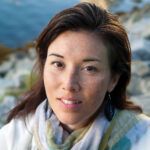Advertisement
Traditional Chinese Medicine
Deep, historical roots offer new medical insights

Where does one start when writing about a medical system that has been in place and evolving for thousands of years? Traditional Chinese medicine (TCM) has deep historical roots based on Eastern principles and philosophies that were cultivated over centuries of observations. These observations of the human body and the environments in which we live, the trial and retrial of treatments, the classification of noted symptoms into patterns of diagnosis—this is science.
Advertisement
TCM speaks a different language
Like many, when I first heard about TCM, I was baffled. Yin and yang? Qi? Meridians? But as I read more about the theories of TCM and how they are applied, this medical system began to make sense to me. Without going into a lesson on the foundations of TCM (there are many books and websites that do that already), let’s investigate why TCM’s language is so different.
Because TCM was founded on principles drawn from observing nature and our place in it, the terminology that is used sounds unusual to our Western way of thinking. A TCM practitioner might say that Wood blocked Earth when diagnosing a patient who has irritable bowel syndrome (IBS) symptoms of diarrhea worsening with heightened stress and feelings of frustration. Or a patient may be told they have Damp-Cold in the joints causing pain and swelling that gets worse in damp and cold weather.
But don’t let the language throw you off. You shouldn’t pay more or less attention to a myocardial infarction than a heart attack. The point is to figure out where things are going wrong and sort out a way to bring it back to balance. TCM is a systemized medical practice that assesses and treats current health issues, while also addressing the underlying causes.
Advertisement
A new old medicine
The paradox of TCM is that one of its greatest strengths—that it has been around a long, long time—is also one of its biggest challenges: people often think that “ancient” means outdated.
Fortunately, TCM hasn’t stayed stagnant, and its treatments are not the same as they were 4,000 or even 100 years ago. I’m fairly certain you’d much rather have your acupuncturist use the sterile, single-use, very fine and smooth, surgical stainless steel needles of today than sharpened slivers of stone or roughly made metal needles.
In addition, we have more current ways of explaining how acupuncture and herbal remedies may work. Acupuncture increases local blood supply, releases endorphins and other feel-good hormones, triggers the release of tight muscles, changes signals from the brain to distant tissues, alters biomagnetic and bioelectric fields in our bodies, and so much more that we’re continuing to learn.
As a result, the conventional medical world is increasingly coming to appreciate the benefits offered by TCM treatments. In particular, acupuncture is frequently recommended to address issues of pain, and it has become a mainstay in many integrative medicine programs.
Chinese herbs such as ginseng, astragalus, and dong quai have been added to many natural remedies, and herbs such as schizandra berries, evodia fruit, and reishi mushrooms have been researched for their health benefits for everything from diarrhea and stress to cancer.
Advertisement
Integrative medicine
I’m fortunate to be working in two integrative and collaborative clinics, Connect Health Centre for Integrative Medicine and Fit To Train. In both clinics, we are team based and patient focused, sharing our knowledge, assessments, and treatment plans. We understand that a team approach is more effective than a single practitioner, especially when it comes to complex cases.
Although TCM is often considered an alternative medicine in the Western world, it has long been integrated with conventional medicine in clinical settings in China.
Advertisement
How to choose a TCM professional
The provinces of BC, Alberta, Ontario, Quebec, and Newfoundland all regulate the practice of acupuncture and the title of acupuncturist. BC and Ontario also regulate the practice of prescribing Chinese herbs. If you live in one of these provinces, make sure to look for a licensed practitioner.
Registered acupuncturists and Chinese herbalists are required to have three years of full-time training, while registered TCM practitioners must have at least four years. Only BC has the designated title for Dr. TCM, with five years of full-time training. The schooling includes courses in anatomy, physiology, pharmacology, and other foundational medical sciences, as well as detailed courses in TCM. All designations also require clinical hours, both written and practical examinations, a safety course, and ongoing continuing education credits.
If you live in one of our non-regulated provinces, you can still find qualified TCM professionals. You may just need to be more diligent with your questions.
Either way, it’s a good idea to ask your current health care practitioners, friends, and colleagues for recommendations. When you find a TCM practitioner, ask about their training and experience. While we aren’t allowed to specialize, many TCM practitioners do focus on treating certain conditions, and so will have further training in those areas.
Keep in mind that, though acupuncture and Chinese herbal remedies are often used by other health professionals, TCM training is as long as it is because it requires deep study and many years of practice to gain proficiency.
Advertisement
What can I expect from my TCM visit?
Your story
Most visits are 50 to 90 minutes long, and the first visit usually involves many questions, not just about your current health concern, but also perhaps about your medical history, diet, supplements, medication, emotional well-being, and lifestyle habits.
Your tongue
What often makes a TCM visit stand out from other health professional visits is that you may be asked to stick out your tongue (nope, no tongue depressor—we aren’t looking at your tonsils). The colour, coat, shape, size, and any markings on the tongue can give clues to what’s going on inside you. Remember to avoid brushing your tongue the day of your appointment, but yes, of course you can brush your teeth.
Your pulse
You’ll also likely have your pulse checked, but not to count beats per minute. The speed, strength, and what we call character of the pulse are noted. Does your pulse feel like a guitar string being plucked? Like a wave rushing in and slowly receding? Or maybe like the back of a comb being run along a bamboo pole? There are 29 possible pulses at three adjacent locations on each wrist. In other words, there are a lot of variables, and these pulses also give clues about your health status.
Your treatment
Once an assessment is made, a TCM practitioner will determine the treatment, which may include traditional forms of treatment such as acupuncture, herbal remedies, and nutritional and lifestyle advice. It may also include more recent modalities such as injection therapy and supplement prescriptions.
Advertisement
How do I prepare for my visit?
Because you’ll be asked to fill out an intake and consent form, make sure you arrive early. It’s also helpful to bring the following:
- your medications and supplements (or at least a detailed list)
- any diagnostic test results
- your questions and key things you want to address
If you’re expecting to receive acupuncture, you might also want to bring shorts and a tank top, though most clinics will provide blankets or other coverings.
Licensing and regulation in Canada
| Province | Therapy | Licensing designation | Regulatory college |
| Alberta | acupuncture | R.Ac. (registered acupuncturist) | acupuncturealberta.ca |
| British Columbia | acupuncture | R.Ac. (registered acupuncturist) | ctcma.bc.ca |
| Chinese herbals | R.TCM.H. (registered TCM herbalist) | ||
| both acupuncture and Chinese herbals | R.TCM.P. (registered TCM practitioner)Dr. TCM (registered doctor of TCM) | ||
| Newfoundland | acupuncture | R.Ac. (registered acupuncturist) | ctcmpanl.ca |
| Ontario | acupuncture | R. Ac (registered acupuncturist) | ctcmpao.on.ca |
| both acupuncture and Chinese herbals | R. TCMP (registered TCM practitioner) | ||
| Quebec | acupuncture | Ac. (registered acupuncturist) | o-a-q.org |
The big question
The first question on the tongue of most of my new patients is, “Is acupuncture painful?” Simple answer: no. Sensation is normal and may include feelings of dullness, aching, tingling, numbness, heaviness, lightness, warmth, cooling, and electric, but it should not be sharp and painful.
Acupuncture needles are very fine, so many needles are not even felt initially. Many patients fall asleep on the table during acupuncture. If you prefer not to have needles, you can ask for other forms of treatment, including herbs, cupping, acupressure, and dietary recommendations.
Insurance and reimbursement options
- Most extended health medical insurance plans have some acupuncture coverage.
- BC’s Medical Service Plan (MSP) covers $23 per acupuncture visit for those who qualify for Premium Assistance, for up to 10 sessions per year.
- Your visits with TCM practitioners may be claimed as medical expenses on your tax return.





